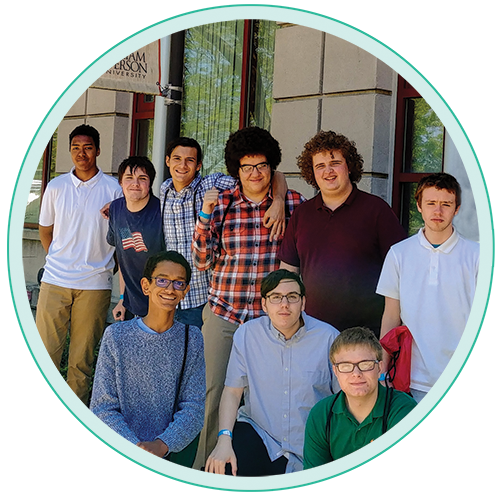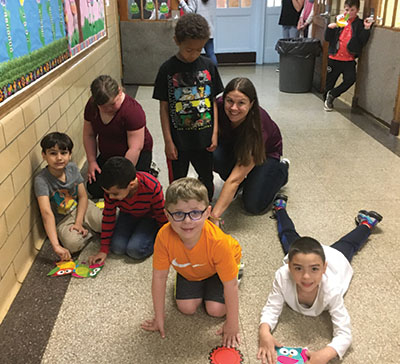Numbers to Know
Interesting statistics about Chapel Hill Academy’s program and student outcomes.
Interesting statistics about Chapel Hill Academy’s program and student outcomes.
 Each year in the spring, the New Jersey Department of Special Education sponsors several leadership conferences that are held at different colleges and universities in the state. The main purpose is to promote peers helping peers, as well as believing in yourself – “Dare to Dream”.
Each year in the spring, the New Jersey Department of Special Education sponsors several leadership conferences that are held at different colleges and universities in the state. The main purpose is to promote peers helping peers, as well as believing in yourself – “Dare to Dream”.
Students from Chapel Hill Academy have had the privilege and honor of participating in different capacities for the last seven years. This past spring our eleventh-grade students had the added honor of presenting a breakout session to other students from around the state.
The topic we presented at William Paterson University was “Self-discovery.” Self-discovery helps students develop confidence and lays the foundation for life. In our breakout session we focused on what makes each of us unique and how extra-curricular activities help us in this process. Our students utilized the Naviance Guidance Program® and Roadtrip Nation® to help facilitate activities and discussions.
“It was a wonderful experience for our students because their involvement helped them discover the confidence and abilities within themselves to create an activity where they got to help others and speak publicly in front of a large group,” said Karen Staats-Bald, MA, LRC, Transition Counselor.
This fall, middle school students took a hike at the Pyramid Mountain Natural Historic Area in Montvale.
This fall, art classes at Chapel Hill Academy took a South America tour as they explored the theme of the “No Drama Llama.”
Diane Somers, Director of Chapel Hill Academy, has been recognized by ASAH, a statewide membership association comprised of more than 130 specialized schools. In November, she received the 2019 ASAH President’s Award for her leadership and vision.
In our elementary Spanish classes, the students learned about the Mexican holiday “Dia de los Muertos” or the Day of the Dead. Dia de los Muertos is a holiday that celebrates friends and relatives that have died and aims to make sure their memories live on in their community.
 Every kid knows that you can build just about anything with Legos®. At Chapel Hill Academy, students are building confidence, joint attention, focus, negotiation skills, and problem solving. Leveraging students’ love of these colorful building bricks, this cross-curricular project has elementary students working together to create “Lego City.”
Every kid knows that you can build just about anything with Legos®. At Chapel Hill Academy, students are building confidence, joint attention, focus, negotiation skills, and problem solving. Leveraging students’ love of these colorful building bricks, this cross-curricular project has elementary students working together to create “Lego City.”
 The concept for Lego City got its start through one student’s project during “Genius Mods,” an independent study module offered to students at CHA. This spring, ten students ages 7-9 took part in the multi-week project in Maureen Dahdah’s elementary school classroom.
The concept for Lego City got its start through one student’s project during “Genius Mods,” an independent study module offered to students at CHA. This spring, ten students ages 7-9 took part in the multi-week project in Maureen Dahdah’s elementary school classroom.
The project is linked to many areas of the curriculum, including math (fractions) and social studies (how government and democratic decision-making works). Students named the city “FlamEngland” – a combination of flamingo and England – to reflect their studies of Colonial America.
“Building with Legos is a multi-sensory, open-ended experience, so I was able to tailor the activity to meet the students’ unique needs. The lesson plans addressed areas of the core curriculum in a way that was fun and engaging. And because it was such a team effort, students used a toolbox of skills to build cooperation and teamwork.”
— Maureen Dahdah, CHA Teacher
 A new sensory hallway at Chapel Hill Academy is giving students the chance to burn off energy and learn to self-regulate so they can be ready for academic learning in the classroom. The hallway features a series of colorful, sequenced decals that guide students as they lizard walk, bunny hop, or skip through a game of hopscotch.
A new sensory hallway at Chapel Hill Academy is giving students the chance to burn off energy and learn to self-regulate so they can be ready for academic learning in the classroom. The hallway features a series of colorful, sequenced decals that guide students as they lizard walk, bunny hop, or skip through a game of hopscotch.
“The sensory path provides an opportunity for the student’s body and brain to refocus, while reducing sensory seeking behaviors and not over-stimulating the child. As children change between classes of their school day, the sensory path can be a built-in opportunity for movement and maintaining attention for any child,” said Stephanie DeVoe, an Occupational Therapist at Chapel Hill Academy.
Researchers have found that physically active students pay more attention, have faster cognitive processing speeds, and do better on standardized tests than children who are less active. Sensory exercises are particularly helpful for kids who have processing issues, stress, anxiety, and ADHD.
“When a student fidgets in class, we view that as communication. They are letting us know that they need to get up and move in order to learn,” said Stephanie. “The sensory hall helps students self regulate; it is a preventative measure to help students with energy and behavior.”
Leaders at Chapel Hill Academy thank Kirsten Hansen, and everyone at Hansen & Ryan Inc., a Totowa-based insurance company, for their generous contribution during Autism Week that made the sensory hall possible.
Congratulations to John Farris, the 2019 winner of the Ruth K. Newman Award for Excellence. The award is bestowed each year by the Council of Private Schools for Children with Special Needs to recognize teaching professionals for outstanding contributions and dedication in providing educational services to children with disabilities.
A 16-year veteran educator, John came to Chapel Hill Academy as a 1:1 paraprofessional, often tasked with supporting the most difficult students. In 2014, John was named leader of the Crisis Response Team, providing support and assistance to teachers working with students with challenging behavior, and leading staff in verbal de-escalation efforts to assist students in crisis.
“John has always excelled, remaining personable, consistent, and positive in the face of emotional and mental hardship, helping his students succeed and reach personal goals,” said Diane Somers, Director.

